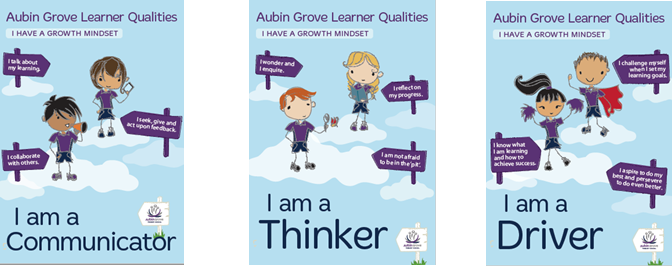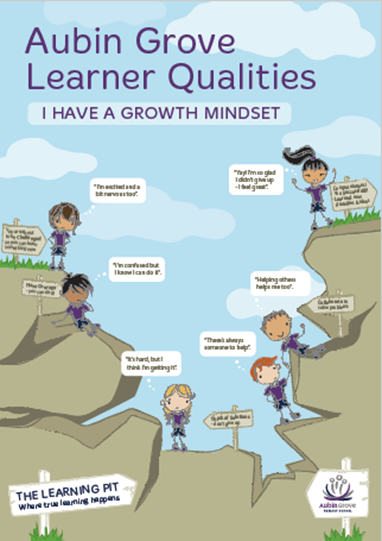During 2016, we surveyed approximately 50 students, from kindergarten to year 6, to determine what they thought a good learner was. We discovered that the vast majority of these students thought a good learner was someone who sat quietly, listened and put their hand up. This gave us evidence proving students didn’t understand how to learn and were more focused on their behaviour. As a staff, we complied a list of qualities that we believed an effective learner demonstrates. We then researched national and international schools who had effectively implemented successful learner qualities. These actions best determined what our learner qualities would be and were then trialled in a number of classrooms late last year before developing our Aubin Grove Learner Qualities.

From the commencement of 2017, teachers have been enthusiastically teaching the learner qualities of ‘I am a Communicator’, ‘I am a Thinker’, ‘I am a Driver’ and ‘The Pit’ (please see the image for more details). Along with the language of growth mindset, these qualities will help turn our students into life long learners. An important part of this process is to not only celebrate individual achievements but to acknowledge that mistakes are a valuable tool to achieve success. Research suggests that students who understand what makes a good learner and how to learn, are more successful than just content based education.

We need your help to embed the language of our learner qualities into the school further. As a valued member of our school community, you are an important part in the process.
How can you help? Here are some conversation starters and questions you can ask your children:What did you learn today?
- What did you learn today?
- How were you successful? How do you know?
If your child says “they made mistakes”, rather than ask why they made the mistake, here are some useful prompts:
- Celebrate the mistake by saying, “mistakes are proof you are trying”.
- What would you do differently next time?
- What did you learn from the mistake?
- Could this be a new goal for you?
- Were you in The Pit today?
- What is the next step in your learning?
- Where to from here?
- What learner quality will help you with this?
- How can I help you?
Our aim is to develop a culture where by students are comfortable and confident to seek help rather than give up. An appreciation of mistakes helps us overcome our fear of making them, enabling us to take risks. But we also want students to understand what kinds of mistakes are most useful and how to most learn from them.



